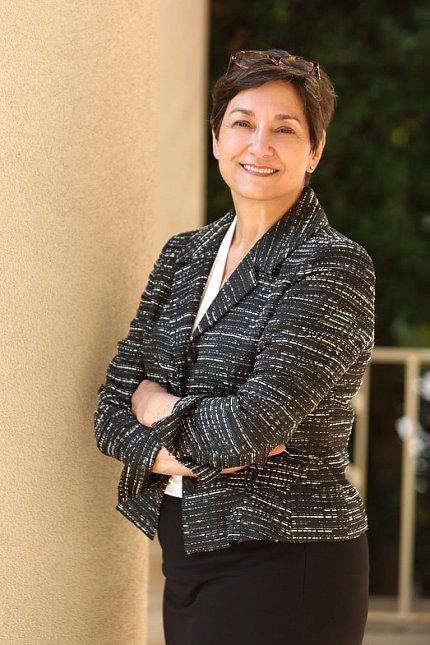NIH Legal Adviser McGarey Bids Farewell

After 38 years in the federal government, including 3 decades at NIH, Barbara McGarey is laying down the law. The deputy associate general counsel of HHS’s Office of General Counsel (OGC), known on campus as the NIH legal adviser, retired in June.
“For a health lawyer, serving NIH is just a dream,” said McGarey. “I have a deep respect and love for science and public health, and it really has been an honor to dedicate my entire professional career to advancing these priorities.”
McGarey has led OGC for the past 17 years, providing in-house counsel and managing a staff of 13 attorneys. Over the years, she has advised NIH senior leaders on a range of issues ranging from intellectual property, grants, gifts and technology transfer to clinical research and hospital operations.
“You have become one of my most trusted advisers,” wrote NIH director Dr. Francis Collins in a letter to McGarey, “and I will profoundly miss your sound counsel.”
“I’ve been in and around NIH in many different capacities, and the perspectives I gained allowed me to more fully understand and support the agency and facilitate NIH research programs,” McGarey said.
She first learned of NIH while interning at the NCI Baltimore Cancer Research Center in 1978. She’d been living in New York, finishing nursing school at Cornell, unsure where she’d wind up next. In Baltimore that summer, her mentor spoke of a renowned hospital in Bethesda that might be a good fit if she was interested in research. After graduation, she headed south.
McGarey recalled, “I loved the combination of clinical nursing with research. That’s why I came.”
Just out of nursing school, McGarey started her NIH career in NHLBI’s hyperlipidemia unit but soon yearned for something more fast-paced and demanding. She got her wish when she transferred to the cardiac surgery unit, where she worked for 4 years.
But it was in her blood to study the law. Inspired by her father, a lawyer-turned-judge, McGarey attended Catholic University’s Columbus School of Law while continuing work part-time at the Clinical Center. At that time, there was limited upward mobility for nurses and the law made sense as a second act. “Support and advocacy are at the heart of both professions,” McGarey reflected.
After a 2-year stint with the Department of Justice through its Honors Program, McGarey arrived at HHS’s OGC, providing legal counsel to the Alcohol, Drug Abuse and Mental Health Administration for 6 years.
In 1993, McGarey found herself back at NIH as deputy director of NIH’s Office of Technology Transfer. In 2000, she took a year-long detail with the then newly established Foundation for the NIH and has since provided extensive legal advice on public-private partnerships, particularly institutional gifts.
McGarey said she’s especially proud of her legal efforts on the many public-private partnerships over the years, the human embryonic stem cell research guidelines and litigation, the NIH Research Tools Guidelines, the CellPro march-in case and the ongoing challenge of the reasonable drug pricing debates. Tackling these and other issues put her in close contact with many administrative offices—Freedom of Information Act, communications, management, ethics, grants, contracts, legislative and science policy, to name a few.
“I’ve always felt like a small-town lawyer working on big-city issues,” she said.
Asked about post-retirement plans, McGarey pleaded the 5th. Her husband Patrick, who is associate director of finance and legislation at NCI, is not retiring anytime soon. They have 3 grown sons and 2 young grandchildren.
McGarey said she’s sad at the idea of leaving NIH and will deeply miss her clients, many of whom are colleagues and friends. “NIH is such a community,” she said. “I hope I’m not leaving NIH; I hope I find a way to stay involved because this is such a wonderful place with a noble mission.”
